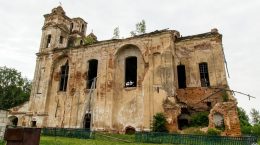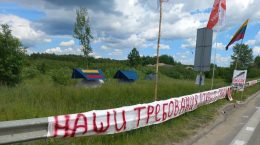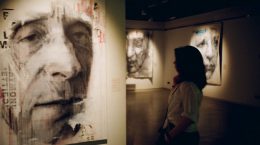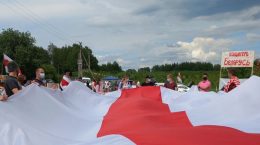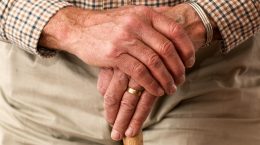«Belarus is turning into a concentration camp» – this is what people often say about modern life in our country. Belarus now is not much different from Auschwitz: there are a lot of security officials around, propaganda, absurd laws, work for a low salary. Especially active protesters get sentences and terms in jails, fines and prison terms. On April 11, the world celebrates the International Day of the liberation of the Nazi concentration camp. It is necessary to remember what happened in those terrible years so that it does not happen again.
On April 11, 1945, the Buchenwald prisoners discovered that the united forces are near the concentration camp. They began a protest. They managed to capture over 800 SS men and guards. And two days later, American troops reached Buchenwald. The uprising saved the prisoners from death because Hitler gave the order to kill the prisoners.
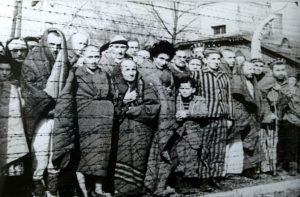 Several large concentration camps were in Belarus. In Ozarichi – a complex of three concentration camps – up to 20 thousand people were tortured. In Maly Trostenets, Nazi soldiers killed more than 206 thousand soldiers, Jews and civilians from all over the USSR. Almost 120 thousand Jews passed through the Minsk Ghetto, 105 thousand of whom died. The concentration camp 5th regiment near Vitebsk was intended for soldiers – more than 80 thousand people died there. In Stalag 352 in Masjukouščyna, fascists killed approximately 80 thousand people there.
Several large concentration camps were in Belarus. In Ozarichi – a complex of three concentration camps – up to 20 thousand people were tortured. In Maly Trostenets, Nazi soldiers killed more than 206 thousand soldiers, Jews and civilians from all over the USSR. Almost 120 thousand Jews passed through the Minsk Ghetto, 105 thousand of whom died. The concentration camp 5th regiment near Vitebsk was intended for soldiers – more than 80 thousand people died there. In Stalag 352 in Masjukouščyna, fascists killed approximately 80 thousand people there.
The illegitimate president constantly repeats that there will never be fascism in Belarus. Belarusian authorities tell that Western countries don’t have such support for veterans of war, former juvenile prisoners of concentration camps. But usually, these people are as powerless as other pensioners.
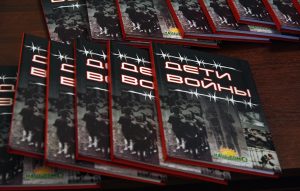 In 2012, in Vitebsk, on the initiative of ICCI «Our House», the book Children of War was published and presented. Its creators tried to convey the most valuable experience of the life of juvenile Nazi prisoners and teach readers to love every moment of life. Those who had seen the horrors of fascism in childhood were invited to the presentation of the book. Activists of «Our House» also raised the question of whether officials think about patriotism and war victims when it comes to money.
In 2012, in Vitebsk, on the initiative of ICCI «Our House», the book Children of War was published and presented. Its creators tried to convey the most valuable experience of the life of juvenile Nazi prisoners and teach readers to love every moment of life. Those who had seen the horrors of fascism in childhood were invited to the presentation of the book. Activists of «Our House» also raised the question of whether officials think about patriotism and war victims when it comes to money.
An example of this was the construction of a burial place for the 5th Regiment concentration camp prisoners. «The city authorities are building dwelling houses, under which are the graves of prisoners,» recalled then a member of the United Civiс Party, an activist of the civil campaign «Our House» Elena Borshchevskaya. «When «Our House» intervened in the construction, the authorities stopped it. We fought against this, invited the chairman of the regional executive committee Alexander Kosinets… And now another house has been laid».
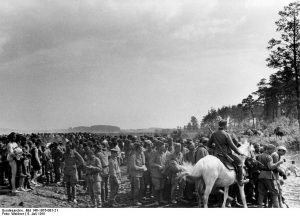
In 2012, the authorities touched the graves of prisoners of the Drozdy concentration camp – the city executive committee planned to lay a power cable to the Dolginovskaya substation. «Our House» called on citizens to appeal to the deputies, find out the reasons for the barbarism at the monument and protect it. Later it became known that the specialists corrected the plan, and the cable would be under «Blood Stream» (this is the name of the mass grave).
There were also several more illustrative stories. In 2013, on the eve of Victory Day, a former prisoner of the Brandenbau concentration camp and her large family were illegally deprived of their homes. The woman lived on Novovilenskaya street in Minsk. Houses on this street were demolished at that time, and authorities offered a family of seven a flat 43.18 sq.m. area instead of the prescribed 90. According to the court’s decision, they removed the from the register.
In the same year, the Berezovsky District Court fined Pavel Levashevich, an 89-year-old pensioner, a second-group visually impaired prisoner of a German concentration camp. The village executive committee refused to send him to a nursing home, did not provide social workers. The pensioner tried to make self-immolation ad burn the head of the village executive committee. In court, no one listened to the man. He got fined – 30 basic units.
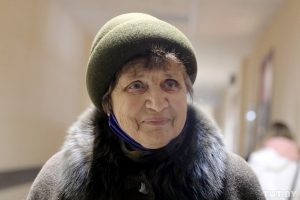 The year 2020 was especially indicative. Several pensioners who survived the war at once fell under the repressions of the illegitimate president. 87-year-old Elizaveta Bursova in childhood evacuated from Vitebsk with relatives evacuated from Vitebsk. That is why the Nazi did not kill her. Her family uncles died during the war. And 16 relatives were killed in the Vitebsk and Beshenkovichi ghettos. In 2020 Elizaveta Bursova was fined under article 23.34 of the Administrative Code for the white-red-white flag on the balcony.
The year 2020 was especially indicative. Several pensioners who survived the war at once fell under the repressions of the illegitimate president. 87-year-old Elizaveta Bursova in childhood evacuated from Vitebsk with relatives evacuated from Vitebsk. That is why the Nazi did not kill her. Her family uncles died during the war. And 16 relatives were killed in the Vitebsk and Beshenkovichi ghettos. In 2020 Elizaveta Bursova was fined under article 23.34 of the Administrative Code for the white-red-white flag on the balcony.
– I had to learn what fascism is in childhood. Bombs flew over my kindergarten. And at the age of 87, I can see another fascism in my country,» she said in an interview with the Current Time TV channel.
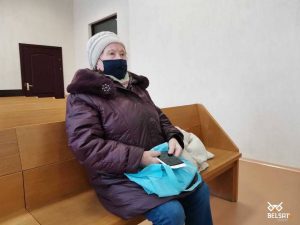 The father of 89-year-old Valeria Smirnova was shot in 1941 as an enemy of the nation. Her family survived the war and famine, so the pensioner is familiar with fascism. On December 14, 2020, she was detained at Independence Square and taken to the Leninsky District police station, where she had to stand for six hours in a poorly heated room with 40 more people. «Lukashenka is lying. And you can’t say something, because they can hit on the head. I used to lie down and watch on the Internet how people are beaten. I do not want to live under this regime,» said the pensioner after the trial on January 12, where she got fined 870 rubles.
The father of 89-year-old Valeria Smirnova was shot in 1941 as an enemy of the nation. Her family survived the war and famine, so the pensioner is familiar with fascism. On December 14, 2020, she was detained at Independence Square and taken to the Leninsky District police station, where she had to stand for six hours in a poorly heated room with 40 more people. «Lukashenka is lying. And you can’t say something, because they can hit on the head. I used to lie down and watch on the Internet how people are beaten. I do not want to live under this regime,» said the pensioner after the trial on January 12, where she got fined 870 rubles.
People who have gone through war and concentration camps deserve compensation for the suffering they endured – at least in the form of respect from the authorities. However, the officials’ words about the need to remember the horrors of war do not correspond with the actions. And on the International Day of the liberation of the Nazi concentration camp, we hope that Belarusian pensioners who have suffered from the repression of the fascists in childhood and from the repression of Lukashenka in old age will be able to see a free Belarus.


